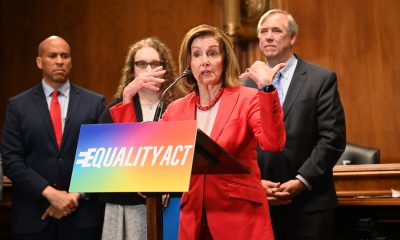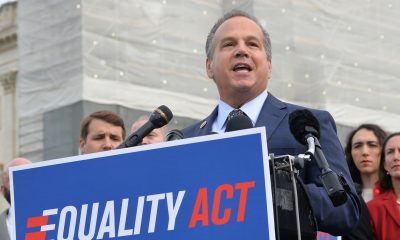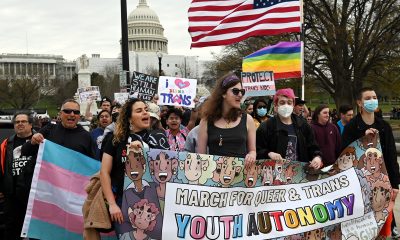National
Two gay candidates shine in fundraising
Pougnet, Cicilline post strong second-quarter results

Congressional candidate David Cicilline, the mayor of Providence, R.I., has raised $1.16 million over the course of his campaign. (Photo courtesy of Cicilline)
Two gay politicians posted strong second-quarter fundraising numbers that could propel them to seats in Congress.
Campaign finance reports made public earlier this month show Steve Pougnet, the mayor of Palm Springs, Calif., and David Cicilline, the mayor of Providence, R.I., boasting particularly strong numbers.
And Pougnet had the added accomplishment of keeping his fundraising numbers on par with his incumbent Republican opponent, Rep. Mary Bono Mack (R-Calif.). Both candidates raised about $400,000 for the April to June period.
The second-quarter numbers mean Pougnet has raised $1,267,910 so far in his campaign, leaving him with $878,283 in cash on hand, while Bono Mack raised $1,731,752, leaving her with $1,241,919 in cash on hand.
In a statement, Pougnet said he’s “incredibly humbled” by the support he’s received in his bid to represent California’s 45th congressional district.
“In these very difficult times, our congresswoman has been absent and it’s clear people are hungry for change,” Pougnet added.
But Ryan Mahoney, campaign manager for Bono Mack, touted the Republican candidate’s fundraising ability and noted that Bono Mack is “humbled” by the support she’s received.
“She is proud to represent the people of California’s 45th congressional district and will continue to fight on their behalf to end reckless spending and debt in Washington and create more jobs and better business opportunities in California,” Mahoney said.
Pougnet’s ability to match Bono Mack during the second quarter is unusual because challengers often do not match their incumbent opponents in fundraising. The fundraising numbers are also significant because the race in the 45th district is widely seen as among the most competitive congressional contests in the country.
The Democratic Congressional Campaign Committee put Pougnet on its “Red to Blue” program, and Bono Mack has been a lawmaker the National Republican Congressional Committee has worked to protect.
Notable donations to Pougnet from LGBT groups include $2,400 from the Gay & Lesbian Victory Fund and $6,900 from the Human Rights Campaign. Both organizations have endorsed the candidate. Donations also have come from Bruce Bastian, a Utah-based gay billionaire philanthropist, who donated $2,400; Hilary Rosen, a D.C. lesbian PR executive, who donated $1,000; and Lane Hudson, a D.C. gay activist, who contributed $300.
But Bono Mack is not without LGBT donors. In April, the Log Cabin Republicans gave $500 to her campaign.
Bono Mack had been considered a pro-LGBT Republican because of her votes in favor of the hate crimes bill and a version of the Employment Non-Discrimination Act, as well as votes against the Federal Marriage Amendment. Her record was tarnished in May when she voted against an amendment that would lead to repeal of “Don’t Ask, Don’t Tell.”
R. Clarke Cooper, Log Cabin’s national director, noted his organization made the $500 contribution prior to Bono Mack’s vote against “Don’t Ask, Don’t Tell” repeal.
He said although Bono Mack voted against the repeal amendment, she ultimately voted in favor of the fiscal year 2011 defense authorization bill as a whole. Consequently, Cooper said Log Cabin’s endorsement of the Republican lawmaker stands.
“[Log Cabin] will continue to work with Representative Bono Mack,” Cooper said. “Using the carrot approach, additional [Log Cabin] PAC funds could be made available contingent upon her future work and performance in the House.”
Cicilline, who’s running to succeed Rep. Patrick Kennedy (D-R.I.) to represent Rhode Island’s 1st congressional district, meanwhile raised $436,000 in the second quarter. He’s raised $1.16 million over the course of his campaign and ended the quarter with $901,000 in cash on hand.
In a statement provided by his campaign, Cicilline said he’s pleased with his fundraising and the LGBT support he received in the second quarter.
“I am extremely grateful to the members of our community who are supporting my campaign for Congress,” he said. “They are helping to ensure that we have the resources necessary to get our message out for the Sept. 14 primary.”
Bill Lynch, the former head of the Rhode Island Democratic Party who’s running against Cicilline in the primary, raised $55,832 in the second quarter. In the same period, he spent $126,000, leaving him with $139,000 in cash on hand.
The winner of the Democratic primary will likely face Republican John Loughlin, an Iraq war veteran and Rhode Island Assembly member. He raised $104,786 in the second quarter while spending $192,000. Loughlin has $101,000 in cash on hand.
Cicilline is running in a safely Democratic district and the Democratic nominee who wins the primary is widely expected to succeed Kennedy in the U.S. House.
The Providence mayor has been the beneficiary of LGBT support over the course of the campaign, particularly during the second quarter. The Gay & Lesbian Victory Fund, which has endorsed Cicilline, contributed $2,400 to his campaign in the second quarter.
Michael Cole, an HRC spokesperson, said his organization donated $721 to Cicilline in the second quarter, which was mostly in-kind contributions raised through HRC’s website.
Noting that HRC previously donated $6,025 to Cicilline, Cole said HRC plans to max out that contribution to $10,000 by year’s end.
Among the notable contributors to Cicilline’s campaign in the second quarter were Bastian, who donated $4,800; Rosen, who donated $500; Joe Solmonese, HRC’s president, who personally donated $500; and Winnie Stachelberg, senior vice president for external affairs at the Center for American Progress, who donated $1,000.
Other gay congressional candidates seeking office didn’t fare as well as Pougnet or Cicilline during the second quarter.
Ed Potosnak, a gay Democratic former staffer for Rep. Mike Honda (D-Calif.) and public school teacher running in New Jersey, raised $47,000 in the second quarter while spending $26,000.
His finances leave him with $72,000 in cash on hand. Potosnak has raised $148,000 over the course of his campaign. Potosnak’s GOP opponent in his race to represent New Jersey’s 7th congressional district, one-term incumbent Rep. Leonard Lance (R-N.J.), raised $108,000. However, he spent nearly $250,000 in the same period, leaving him with $359,000 in cash on hand.
In what could be an uphill battle for a U.S. House seat, Potosnak is running in a traditionally Republican district. He hasn’t been endorsed by HRC or the Victory Fund.
Despite the funding disparity, Potosnak said he’s happy with the amount he raised in the second quarter because it came from individuals donors and not special interest money.
“Compared to the opponent, the guy that I’m running against, Congressman Lance, I received more contribution from individuals in the last filing — about $5,000 more,” Potosnak said. “I didn’t get the special interest money from the big banks and Wall Street that are fueling his campaign.”
A similar situation with campaign finances is playing out in Florida’s 17th congressional district, where nine candidates, including North Miami City Council member Scott Galvin, are vying for the Democratic nomination in a primary set for Aug. 24.
After raising $57,000 in the second quarter while spending $97,000, Galvin had about $15,000 in cash on hand. He’s raised about $112,000 over the course of his campaign, according to FEC records.
Galvin said he’s feeling good about his finances for the second quarter and was preparing to submit an amended report showing that he has raised $130,000 over the course of his campaign.
“We found several pages of donations that didn’t get included by accident, so for what it’s worth, the to-date total, I guess, would show $130,000,” Galvin said.
The Gay & Lesbian Victory Fund, which has endorsed Galvin, contributed $2,400 to his campaign during the second quarter.
The candidate in the Democratic primary with the greatest war chest is Rudolph Moise, a physician and president of the Comprehensive Health Center in North Miami. He raised $938,162 for his campaign, although $800,000 was a personal loan to his campaign from himself. He spent $280,000 in the second quarter, leaving him with $909,000 in cash on hand.
Galvin said the disparity in finances didn’t bother him and he would remain focused on a “grassroots concentrated effort.”
“We’re doing it through all the old-fashioned, knocking-on-door, mail-to-the-home, traditional way of campaigning,” he said.
The 17th congressional district in Florida is also considered a safely Democratic seat. No Republican candidate has filed for candidacy, so the winner of the Democratic primary would be the presumptive winner of the seat.
Federal Government
Treasury Department has a gay secretary but LGBTQ staff are under siege
Agency reverses course on LGBTQ inclusion under out Secretary Scott Bessent

A former Treasury Department employee who led the agency’s LGBTQ employee resource group says the removal of sexual orientation and gender identity (SOGI) from its discrimination complaint forms was merely a formalization of existing policy shifts that had already taken hold following the second inauguration of President Donald Trump and his appointment of Scott Bessent — who is gay — to lead the agency.
Christen Boas Hayes, who served on the policy team at Treasury’s Financial Crimes Enforcement Network (FinCEN) from 2020 until March of this year, told the Washington Blade during a phone interview last week that the agency had already stopped processing internal Equal Employment Opportunity (EEO) complaints on the basis of anti-LGBTQ discrimination.
“So the way that the forms are changing is a procedural recognition of something that’s already happening,” said Hayes. “Internally, from speaking to two EEO staff members, the changes are already taking place from an EEO perspective on what kind of cases will be found to have the basis for a complaint.”
The move, they said, comes amid the deterioration of support structures for LGBTQ workers at the agency since the administration’s early rollout of anti-LGBTQ executive orders, which led to “a trickle down effect of how each agency implements those and on what timeline,” decisions “typically made by the assistant secretary of management’s office and then implemented by the appropriate offices.”
At the end of June, a group of U.S. House Democrats including several out LGBTQ members raised alarms after a Federal Register notice disclosed Treasury’s plans to revise its complaint procedures. Through the agency’s Office of Civil Rights and EEO, the agency would eliminate SOGI as protected categories on the forms used by employees to initiate claims of workplace discrimination.
But Hayes’s account reveals that the paperwork change followed months of internal practice, pursuant to a wave of layoffs targeting DEI personnel and a chilling effect on LGBTQ organizing, including through ERGs.
Hayes joined Treasury’s FinCEN in 2020 as the agency transitioned into the Biden-Harris administration, working primarily on cryptocurrency regulation and emerging technologies until they accepted a “deferred resignation” offer, which was extended to civil servants this year amid drastic staffing cuts.
“It was two things,” Hayes said. “One was the fact that the policy work that I was very excited about doing was going to change in nature significantly. The second part was that the environment for LGBTQ staff members was increasingly negative after the release of the executive orders,” especially for trans and nonbinary or gender diverse employees.
“At the same time,” Hayes added, “having been on the job for four years, I also knew this year was the year that I would leave Treasury. I was a good candidate for [deferred resignation], because I was already planning on leaving, but the pressures that emerged following the change in administration really pushed me to accelerate that timeline.”
Some ERGs die by formal edict, others by a thousand cuts
Hayes became involved with the Treasury LGBTQ ERG shortly after joining the agency in 2020, when they reached out to the group’s then-president — “who also recently took the deferred resignation.”
“She said that because of the pressure that ERGs had faced under the first Trump administration, the group was rebuilding, and I became the president of the group pretty quickly,” Hayes said. “Those pressures have increased in the second Trump administration.”
One of the previous ERG board members had left the agency after encountering what Hayes described as “explicitly transphobic” treatment from supervisors during his gender transition. “His supervisors denied him a promotion,” and, “importantly, he did not have faith in the EEO complaint process” to see the issues with discrimination resolved, Hayes said. “And so he decided to just leave, which was, of course, such a loss for Treasury and our Employee Resource Group and all of our employees at Treasury.”
The umbrella LGBTQ ERG that Hayes led included hundreds of members across the agency, they said, and was complemented by smaller ERGs at sub-agencies like the IRS and FinCEN — several of which, Hayes said, were explicitly told to cease operations under the new administration.
Hayes did not receive any formal directive to shutter Treasury’s ERG, but described an “implicit” messaging campaign meant to shut down the group’s activities without issuing anything in writing.
“The suggestion was to stop emailing about anything related to the employee resource group, to have meetings outside of work hours, to meet off of Treasury’s campus, and things like that,” they said. “So obviously that contributes to essentially not existing functionally. Because whereas we could have previously emailed our members comfortably to announce a happy hour or a training or something like that, now they have to text each other personally to gather, which essentially makes it a defunct group.”
Internal directories scrubbed, gender-neutral restrooms removed
Hayes said the dismantling of DEI staff began almost immediately after the executive orders. Employees whose position descriptions included the terms “diversity, equity, and inclusion” were “on the chopping block,” they said. “That may differ from more statutorily mandated positions in the OMWI office or the EEO office.”
With those staff gone, so went the infrastructure that enabled ERG programming and community-building. “The people that made our employee resource group events possible were DEI staff that were fired. And so, it created an immediate chilling effect on our employee resource group, and it also, of course, put fear into a lot of our members’ hearts over whether or not we would be able to continue gathering as a community or supporting employees in a more practical way going forward. And it was just, really — it was really sad.”
Hayes described efforts to erase the ERGs from internal communication channels and databases. “They also took our information off internal websites so nobody could find us as lawyers went through the agency’s internal systems to scrub DEI language and programs,” they said.
Within a week, Hayes said, the administration had removed gender-neutral restrooms from Main Treasury, removed third-gender markers from internal databases and forms, and made it more difficult for employees with nonbinary IDs to access government buildings.
“[They] made it challenging for people with X gender markers on identification documents to access Treasury or the White House by not recognizing their gender marker on the TWAVES and WAVES forms.”
LGBTQ staff lack support and work amid a climate of isolation
The changes have left many LGBTQ staff feeling vulnerable — not only because of diminished workplace inclusion, but due to concerns about job security amid the administration’s reductions in force (RIFs).
“Plenty of people are feeling very stressed, not only about retaining their jobs because of the layoffs and pending questions around RIFs, but then also wondering if they will be included in RIF lists because they’re being penalized somehow for being out at work,” Hayes said. “People wonder if their name will be given, not because they’re in a tranche of billets being laid off, but because of their gender identity or sexual orientation.”
In the absence of functional ERGs, Hayes said, LGBTQ employees have been cut off from even informal networks of support.
“Employees [are] feeling like it’s harder to find members of their own community because there’s no email anymore to ask when the next event is or to ask about navigating healthcare or other questions,” they said. “If there is no ERG to go to to ask for support for their specific issue, that contributes to isolation, which contributes to a worse work environment.”
Hayes said they had not interacted directly with Secretary Bessent, but they and others observed a shift from the previous administration. “It is stark to see that our first ‘out’ secretary did not host a Pride event this year,” they said. “For the last three years we’ve flown the rainbow Pride flag above Treasury during Pride. And it was such a celebration among staff and Secretary Yellen and the executive secretary’s office were super supportive.”
“Employees notice changes like that,” they added. “Things like the fact that the Secretary’s official bio says ‘spouse’ instead of ‘husband.’ It makes employees wonder if they too should be fearful of being their full selves at work.”
The Blade contacted the Treasury Department with a request for comment outlining Hayes’s allegations, including the removal of inclusive infrastructure, the discouragement of ERG activity, the pre-formalization of EEO policy changes, and the targeting of DEI personnel. As of publication, the agency has not responded.
U.S. Supreme Court
Supreme Court to consider bans on trans athletes in school sports
27 states have passed laws limiting participation in athletics programs

The U.S. Supreme Court on Thursday agreed to hear two cases involving transgender youth challenging bans prohibiting them from participating in school sports.
In Little v. Hecox, plaintiffs represented by the ACLU, Legal Voice, and the law firm Cooley are challenging Idaho’s 2020 ban, which requires sex testing to adjudicate questions of an athlete’s eligibility.
The 9th U.S. Circuit Court of Appeals described the process in a 2023 decision halting the policy’s enforcement pending an outcome in the litigation. The “sex dispute verification process, whereby any individual can ‘dispute’ the sex of any female student athlete in the state of Idaho,” the court wrote, would “require her to undergo intrusive medical procedures to verify her sex, including gynecological exams.”
In West Virginia v. B.P.J., Lambda Legal, the ACLU, the ACLU of West Virginia, and Cooley are representing a trans middle school student challenging the Mountain State’s 2021 ban on trans athletes.
The plaintiff was participating in cross country when the law was passed, taking puberty blockers that would have significantly reduced the chances that she could have a physiological advantage over cisgender peers.
“Like any other educational program, school athletic programs should be accessible for everyone regardless of their sex or transgender status,” said Joshua Block, senior counsel for the ACLU’s LGBTQ and HIV Project. “Trans kids play sports for the same reasons their peers do — to learn perseverance, dedication, teamwork, and to simply have fun with their friends,” Block said.
He added, “Categorically excluding kids from school sports just because they are transgender will only make our schools less safe and more hurtful places for all youth. We believe the lower courts were right to block these discriminatory laws, and we will continue to defend the freedom of all kids to play.”
“Our client just wants to play sports with her friends and peers,” said Lambda Legal Senior Counsel Tara Borelli. “Everyone understands the value of participating in team athletics, for fitness, leadership, socialization, and myriad other benefits.”
Borelli continued, “The U.S. Court of Appeals for the Fourth Circuit last April issued a thoughtful and thorough ruling allowing B.P.J. to continue participating in track events. That well-reasoned decision should stand the test of time, and we stand ready to defend it.”
Shortly after taking control of both legislative chambers, Republican members of Congress tried — unsuccessfully — to pass a national ban like those now enforced in 27 states since 2020.
Federal Government
UPenn erases Lia Thomas’s records as part of settlement with White House
University agreed to ban trans women from women’s sports teams

In a settlement with the Trump-Vance administration announced on Tuesday, the University of Pennsylvania will ban transgender athletes from competing and erase swimming records set by transgender former student Lia Thomas.
The U.S. Department of Education’s Office for Civil Rights found the university in violation of Title IX, the federal rights law barring sex based discrimination in educational institutions, by “permitting males to compete in women’s intercollegiate athletics and to occupy women-only intimate facilities.”
The statement issued by University of Pennsylvania President J. Larry Jameson highlighted how the law’s interpretation was changed substantially under President Donald Trump’s second term.
“The Department of Education OCR investigated the participation of one transgender athlete on the women’s swimming team three years ago, during the 2021-2022 swim season,” he wrote. “At that time, Penn was in compliance with NCAA eligibility rules and Title IX as then interpreted.”
Jameson continued, “Penn has always followed — and continues to follow — Title IX and the applicable policy of the NCAA regarding transgender athletes. NCAA eligibility rules changed in February 2025 with Executive Orders 14168 and 14201 and Penn will continue to adhere to these new rules.”
Writing that “we acknowledge that some student-athletes were disadvantaged by these rules” in place while Thomas was allowed to compete, the university president added, “We recognize this and will apologize to those who experienced a competitive disadvantage or experienced anxiety because of the policies in effect at the time.”
“Today’s resolution agreement with UPenn is yet another example of the Trump effect in action,” Education Secretary Linda McMahon said in a statement. “Thanks to the leadership of President Trump, UPenn has agreed both to apologize for its past Title IX violations and to ensure that women’s sports are protected at the university for future generations of female athletes.”
Under former President Joe Biden, the department’s Office of Civil Rights sought to protect against anti-LGBTQ discrimination in education, bringing investigations and enforcement actions in cases where school officials might, for example, require trans students to use restrooms and facilities consistent with their birth sex or fail to respond to peer harassment over their gender identity.
Much of the legal reasoning behind the Biden-Harris administration’s positions extended from the 2020 U.S. Supreme Court case Bostock v. Clayton County, which found that sex-based discrimination includes that which is based on sexual orientation or gender identity under Title VII rules covering employment practices.
The Trump-Vance administration last week put the state of California on notice that its trans athlete policies were, or once were, in violation of Title IX, which comes amid the ongoing battle with Maine over the same issue.




















